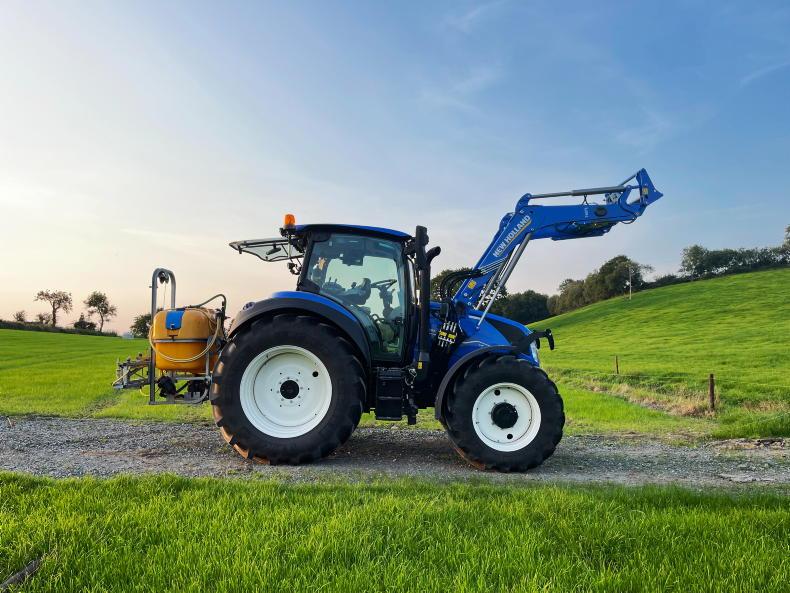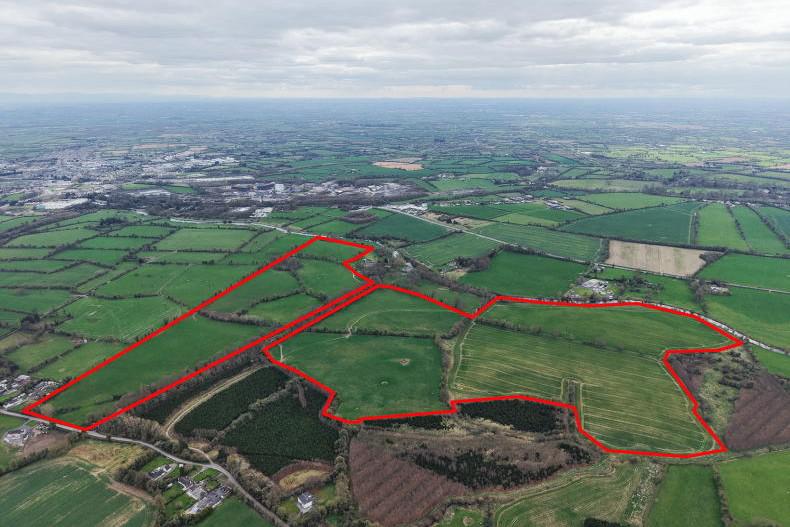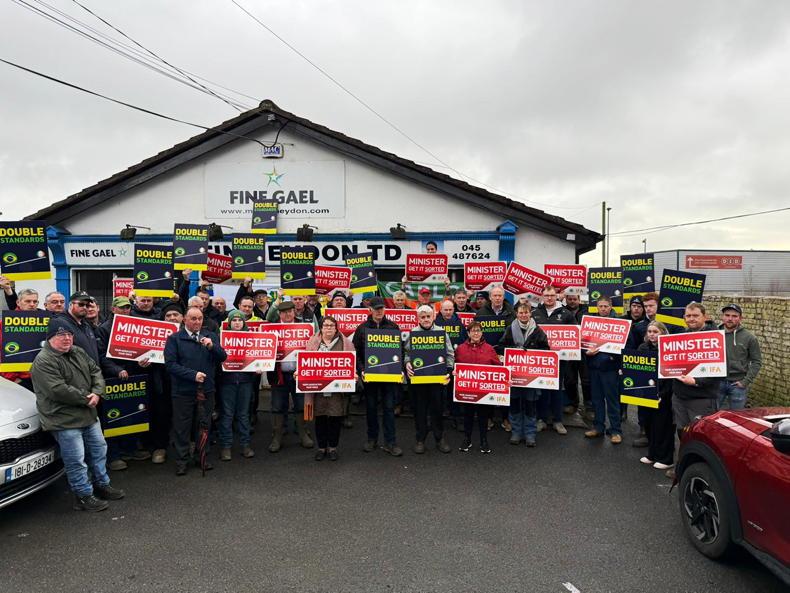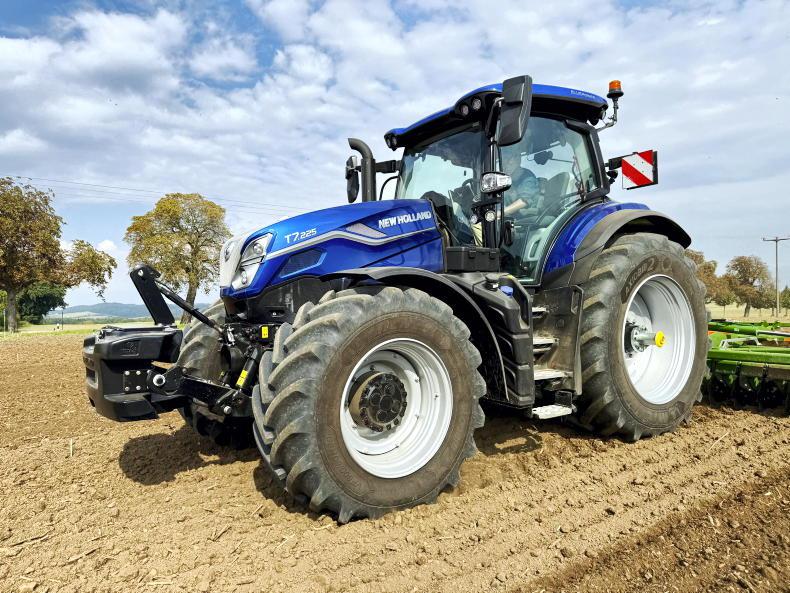Supply chain issues, the increased use of technology and the stringent rules around engine emissions are driving the price of new tractors to unprecedented levels.
A new tractor is one of the biggest investments a farmer can make, so the decision has to be carefully considered.
Reliability is important, but this comes at a price. When looking to upgrade your tractor, buying is not the only way. Hiring is another option.
In this piece, we analyse the costs and viability of hiring a new tractor instead of buying. Hiring a tractor offers a fixed-price solution. A new tractor is a fixed asset and will also quickly depreciate in value.
We have chosen to base our figures on a new 120hp tractor with a front loader, which represents the majority of livestock farmers’ tractors.
Hiring a tractor
When it comes to a hire agreement, farmers have two options – short-term or long-term hire.
A short-term agreement is charged at a weekly rate. A 120hp tractor and front loader will cost around €580 (€470 ex-VAT) per week. There is a weekly cap on hours, usually around 40, with an additional charge of €14 (€11.50 ex-VAT) per hour when the cap is exceeded.
A long-term agreement is usually for 12 months and has a set price. A 120hp tractor and loader will cost €14,760 (€12,000 ex VAT) for 1,000 hours. For every hour over this, there is an additional charge of €14 (€11.50 ex-VAT) per hour.
To get the best value for money in a hire agreement, it is important that the tractor is used to its maximum, without surpassing the hourly limit. Anything over this and hire begins to get expensive.
Payment terms on an annual hire basis vary between vendors. Some look for three months’ hire payment up front, while others look for a refundable deposit of €1,230 (€1,000 ex-VAT).
Payments are made by direct debit at the start of each month and the farmer must provide fully comprehensive insurance cover for the tractor. The full hire cost is a farm expense and is therefore tax deductible each year.
Regardless of whether a tractor is bought or hired, diesel and insurance costs will be the same.
The major benefit of a hire agreement is that wear and tear on parts such as tyres are covered by the agent. Depending on application, this alone this can be a saving in the region of €1/hr, or €1,000/year on a 1,000hr tractor.
In a hire arrangement, maintenance and repairs such as servicing and breakdowns are not incurred by the farmer, which can provide peace of mind and less risk around unforeseen expenses.
However, damage caused to the tractor by the farmer will be at the farmer’s expense.
Buying a tractor
In today’s market, a 120hp premium branded tractor and loader will cost around €115,000 (€93,500 ex-VAT), depending on brand and specification.
In most cases, a farmer would trade in a tractor when purchasing new. In this scenario, we have assumed a trade-in value of €35,000 (€28,500 ex-VAT), which reduces the overall cost of buying new to €80,000 (€65,000 ex-VAT).
There are now a number of options to fund this purchase worth €80,000.
Hire purchase and leasing
If the farmer has cash in the business, a cheque can be written. Fewer tractors are purchased this way, due to other demands on a farmer’s cash.
Both lease finance and hire purchase (HP) are popular options.
The main difference between the two is that in a lease, the farmer doesn’t become the rightful owner until the last payment is made. The lease is usually for a period of three to five years.
With HP, the interest charges are written off over the period and the cost of the tractor is written off in equal instalments over eight years.
The big advantage of this is that if and when a farmer decides to buy another tractor, they won’t be hit with a big tax bill for a trade-in, regardless of its worth.
But, if trading in a leased machine which is then worth, for example, €35,000, this will be treated as income and there will be tax due.
By switching to HP, there won’t be the same problem the next time, as you are writing it off over the eight years.
Where farmers need to be careful is if they are registered for VAT. With leases, the VAT is only recoverable over the period for which the lease payments are made.
If buying the tractor by HP, the first big advantage is that the farmer can recover the full amount of VAT on the tractor on purchase.
Bank loan/MilkFlex
Alternatively, farmers can turn to their bank or co-op (through the MilkFlex loan scheme) to finance a tractor. The term can be anything from three to eight years.
Eight years can be suitable as it is in line with the time frame in which the tractor value is written off in the accounts. Interest rates can be charged anything from 0% to 6%, depending on individual situation.
Farmers need to be aware that zero percent interest rates may come at a cost of a higher initial purchase price. Discounts may be given if a farmer opts to finance the tractor to a bank loan.
Usually, machinery manufacturers are linked to specific financial providers.
In this example, if a farmer chooses to fund the tractor (€80,000) through a MilkFlex loan over an eight-year term and a rate of 4.1% (inclusive of charges), the repayments amount to approximately €11,500 per year for eight years. The farmer owns the tractor on the first day purchased. It is treated as an asset and is therefore subject to depreciation, which is tax-deductible.
All machinery owned is written off over eight years at 12.5% per year. In this case, the depreciation charge per year is €10,000 for eight years. The interest is approximately €1,500/year, which is also tax-deductible.
This option tends to be attractive for farmers in a high tax situation.
In summary
The decision to buy or hire your next tractor will boil down to a farmer’s individual situation.
If you buy, you will own the tractor and it will be classed as an asset. Although it will cost less money over the lifetime of the tractor, compared with hiring, the tractor may have a larger cash cost, ie maintenance and tyres.
Hiring is a real option for a farmer who may have a high tax bill. It is vital that farmers keep an eye on the number of hours accumulating on the hired tractor. Too many hours over the agreed contracted hours could amount to high costs and perhaps make it unviable.
Obviously, the big attraction to a hire agreement is that the farmer can drive a new tractor every year, with no wear and tear-related costs or excess bills, meaning the cost of operating the tractor is fixed.
We would recommend that you seek independent financial advice before considering these options to ensure you find the most appropriate solution for your farm.








SHARING OPTIONS